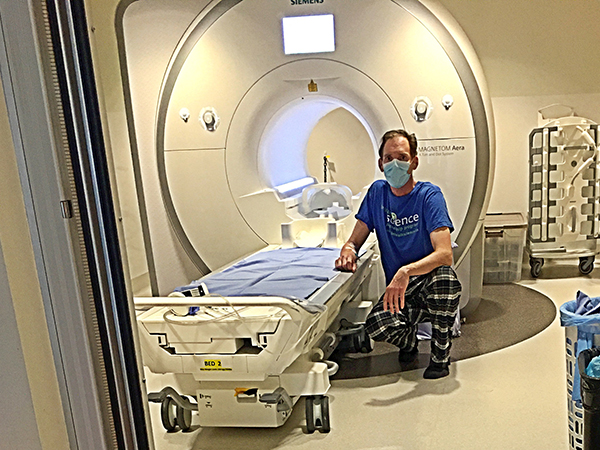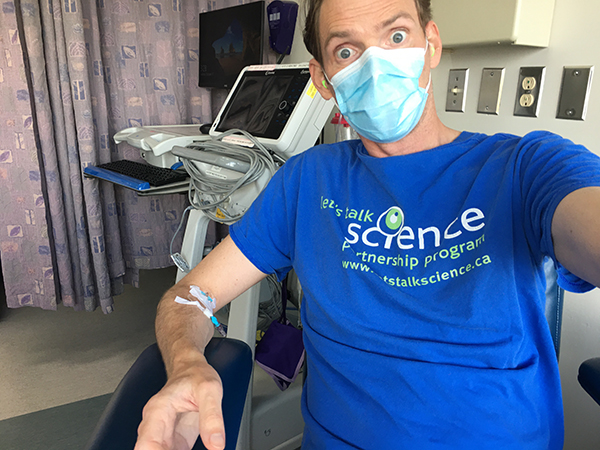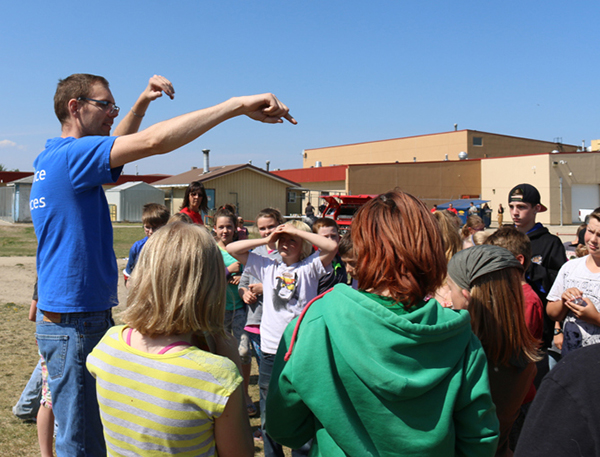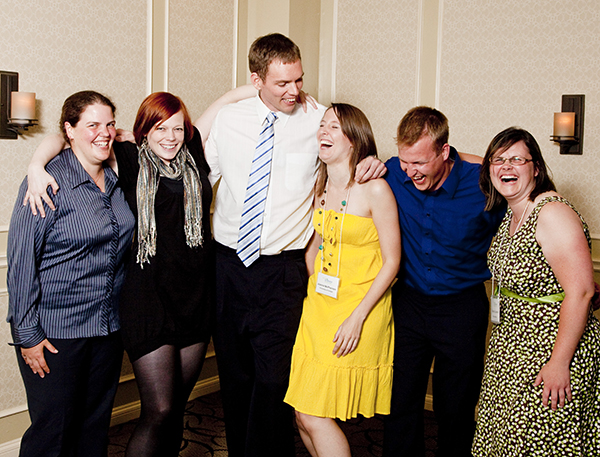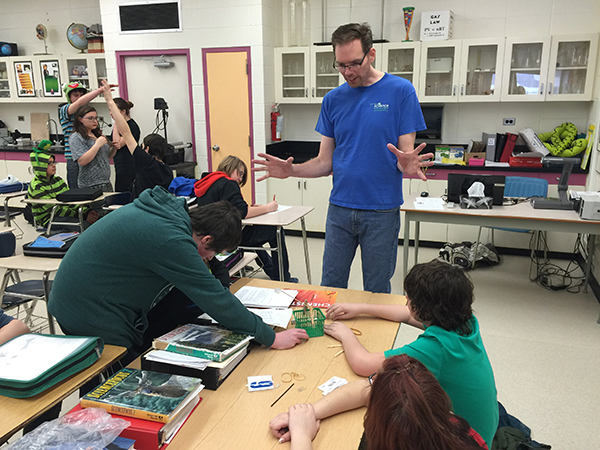There’s So Much to Learn
Let's Talk Science is saddened to hear Jason Peterson lost his battle in July 2023. He will be missed by many.
Jason Peterson believes in the power of science. Not just to inspire youth, give them valuable skills and perhaps trigger career ideas. But to solve medical mysteries and change the trajectory of illnesses.
Those ideas have been central to his life – as a scientist and long-time member of the Let’s Talk Science family. Specifically, Jason is deeply interested in research about oligodendroglioma, a type of brain tumour. He marvels at the recent progress made into understanding its causes, effects and how to combat it. “90% of the information we have on this disease comes from the last 10 years,” he says.
That’s amazing progress. “We’re learning incredible amounts, and there’s so much more to learn,” he says.
The next breakthroughs, however, won’t come soon enough for Jason, who lives in Camrose, Alberta. He was diagnosed with oligodendroglioma 13 years ago, at the age of 30, after experiencing a seizure. He learned then that the tumour had been growing slowly in his brain since he was about two years old, slow enough that his brain could adapt.
Jason has been through surgery, drugs, chemotherapy and radiation. Everything he’s done has been experimental, he was the first person to have remote controlled surgery with NeuroArm. Now the tumour is growing faster. In September 2020, Jason was told he had six-eight months left. “I’ll live as long as I can in good condition, and do as much as I can,” he says.
Jason also decided to openly share his experiences, showcasing the importance of science and its impact on his own life.
He has certainly done much in his 43 years. When Jason was a boy in Tilley, Alberta, he enjoyed science but didn’t yet know it would occupy his life. What did he want to be when he grew up? “I didn’t have an idea,” he says.
His mom was a teacher and computer programmer, his dad a farmer. Tilley was and remains a tiny hamlet, and Jason completed Grade 12 in the same room he did kindergarten.
After high school, Jason pursued a range of interests. At Augustana University College (now part of University of Alberta), he earned a BA in Philosophy and Developmental Studies, and a BSc in Biology and Environmental Science.
Then it was on to Simon Fraser University, for a MSc and PhD in Behavioural Ecology.
It was at Simon Fraser, in 2003, that Jason first volunteered with Let’s Talk Science. A friend was heading the outreach program and asked Jason to help out. Jason didn’t know much about the organization, but it sounded like fun.
He remembers his first Let’s Talk Science Outreach activity. He divided a Grade 6 class into groups and had the students pretend they were a colony of bees (something that would end up relating to his professional life). Jason gave them a challenge of communicating a simple message, from bee to bee, without using traditional sounds.
That was a blast, and the engaging, hands-on nature of Let’s Talk Science hooked him. Eventually, Jason took on a leadership position and became coordinator of the Let’s Talk Science at Simon Fraser University. He was responsible for recruiting volunteers and teachers, running the site office and managing activities and visits for over 3,000 students every year in Greater Vancouver, rural British Columbia and Alberta. In 2007, Let's Talk Science named him Volunteer of the Year.
Jason’s nomination letter was filled with thanks and appreciation, including: “Jason worked well with the students, kept them on task and involved. He constantly asked for suggestions and prompted them on how to improve their projects. This has been an excellent experience and we are thankful for the opportunity that Jason provided us.”
“Jason has inspired me for many years; he is a true teacher. As a volunteer, site coordinator and project staff, he lives Let’s Talk Science values completely,” said President and Founder of Let’s Talk Science, Bonnie Schmidt. “From his diagnosis, Jason decided to share his experiences openly to raise awareness about cancer and showcase the importance of scientific research. He raised quite a bit of money for the Brain Tumour Foundation. Plus, his smile is contagious and his positive attitude is infectious!”
After university, Jason took on a series of interesting work challenges. He was a consultant for the Canadian Food Inspection Agency, and part of a national team developing biosecurity standards in the bee industry. He was also a researcher for Alberta’s Alfalfa Seed Commission, and a sessional lecturer in biology at the University of Alberta.
Along the way, he continued to volunteer for Let’s Talk Science. In 2016, he joined as staff to support a special project in Fox Creek, High Prairie, and local Cree First Nations and Metis communities.
“It was unbelievably well-received,” he recalls.
His contributions to reaching Indigenous youth have been incorporated into Let’s Talk Science best practices; the bee activity he created is now done by volunteers across the country; his cheering and encouragement have kept many staff members motivated in challenging times.
“Given the scope of Jason’s contribution to Let’s Talk Science, and the resulting number of children and volunteers who have benefited thus far from his work in some way, it is unavoidable that many were inspired into a STEM pathway and themselves became a mentor to others,” said Director, Youth and Volunteer Experience, Isabel Deslauriers.
Jason wants students to have a better understanding of science and get over the fear that it’s something they can’t do.
Too many children, he says, feel that science is hard. For him, and for the young people he has reached, there’s a different answer. “Science is fascinating,” he says.
That wonder still fills him. When he speaks of his brain tumour he says “there’s so much to learn”, that could also be a mantra for science, education and life.
As a Let’s Talk Science volunteer, site coordinator and project staff, Jason has been deeply committed to the principles of the organization. He has always given back in service to others.
Now, in publicly sharing his health challenge and prognosis, he remains a champion for science. Jason knows that his fundraising work for the Brain Tumour Foundation of Canada will help others, just as previous efforts have helped him.
That’s the nature of science, in any realm – always building on what came before. About 55,000 Canadians live with a brain tumour. When Jason tumour first formed, four decades ago, treatment for his type of cancer didn’t even exist. Now there’s more hope for discovering causes, treatments and, most of all, cures.
“We’re trying to help the next generation have the knowledge,” says Jason, “so that they can do more.”
